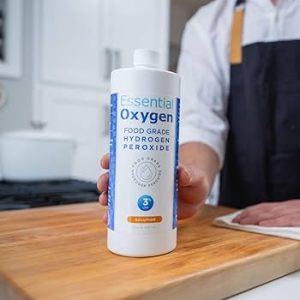Hydrogen Peroxide: Your New Cleaning Essential
Hydrogen peroxide (H₂O₂) is a versatile and eco-friendly cleaning agent that has gained popularity as a safer alternative to harsh chemicals. This article explores the various ways hydrogen peroxide can be utilized in your cleaning routine, highlighting its effectiveness, safety, and benefits.
What Is Hydrogen Peroxide?
Hydrogen peroxide is a chemical compound consisting of two hydrogen atoms and two oxygen atoms. In its common 3% solution form, it’s a mild antiseptic and oxidizer. Unlike many chemical cleaners, hydrogen peroxide breaks down into water and oxygen, making it an environmentally friendly option for cleaning.
Benefits of Using Hydrogen Peroxide for Cleaning
Hydrogen peroxide offers several advantages as a cleaning agent:
Disinfectant Properties: Effective against bacteria, viruses, and fungi.
Eco-Friendly: Breaks down into harmless byproducts.
Non-Toxic: Safer for households with children and pets.
Versatile: Suitable for various surfaces and materials.
How to Use Hydrogen Peroxide for Cleaning
Hydrogen peroxide can be used in different ways depending on the cleaning task:
1. Kitchen Cleaning
Disinfect Cutting Boards: Spray undiluted hydrogen peroxide on cutting boards, especially after handling raw meat, to kill bacteria.
Clean Sponges and Dishcloths: Soak sponges and dishcloths in hydrogen peroxide to eliminate germs and odors.
Remove Stains from Cookware: Apply hydrogen peroxide to stained cookware, let it sit, then scrub to remove stains.
2. Bathroom Cleaning
Disinfect Toilet Bowls: Pour hydrogen peroxide into toilet bowls, let it sit, then scrub to disinfect and remove stains.
Clean Grout: Apply hydrogen peroxide to grout lines, let it sit, then scrub to remove mold and mildew.
Shine Mirrors and Glass: Spray hydrogen peroxide on mirrors and glass surfaces, then wipe with a lint-free cloth for a streak-free shine.
3. Laundry Applications
Whiten Whites: Add hydrogen peroxide to the washing machine to brighten white fabrics.
Remove Stains: Apply hydrogen peroxide directly to stains, let it sit, then wash as usual to remove stains.
Disinfect Washing Machine: Run an empty wash cycle with hydrogen peroxide to disinfect and clean the washing machine.
4. Mold and Mildew Removal
Hydrogen peroxide is effective in killing mold and mildew on hard surfaces:
Apply Directly: Spray undiluted hydrogen peroxide on affected areas, let it sit, then scrub to remove mold and mildew.
Prevent Recurrence: Regular application can help prevent mold and mildew growth.
5. Garden Use
Hydrogen peroxide can be used in gardening for various purposes:
Seed Germination: Soak seeds in a diluted hydrogen peroxide solution before planting to promote germination.
Plant Health: Use a diluted hydrogen peroxide solution to water plants, helping to prevent root rot and promote healthy growth.
Safety Precautions
While hydrogen peroxide is generally safe, it’s important to follow these precautions:
Use Proper Concentration: For household cleaning, use a 3% hydrogen peroxide solution.
Avoid Mixing with Other Chemicals: Do not mix hydrogen peroxide with vinegar, bleach, or ammonia, as this can produce harmful reactions.
Store Properly: Keep hydrogen peroxide in its original brown bottle, stored in a cool, dark place to maintain its effectiveness.
Conclusion
Hydrogen peroxide is a powerful, eco-friendly, and versatile cleaning agent that can be used throughout your home. By incorporating hydrogen peroxide into your cleaning routine, you can effectively disinfect surfaces, remove stains, and maintain a healthier living environment. Always follow safety guidelines and use the appropriate concentration for each task to ensure optimal results

Hydrogen Peroxide: Your New Cleaning Essential
